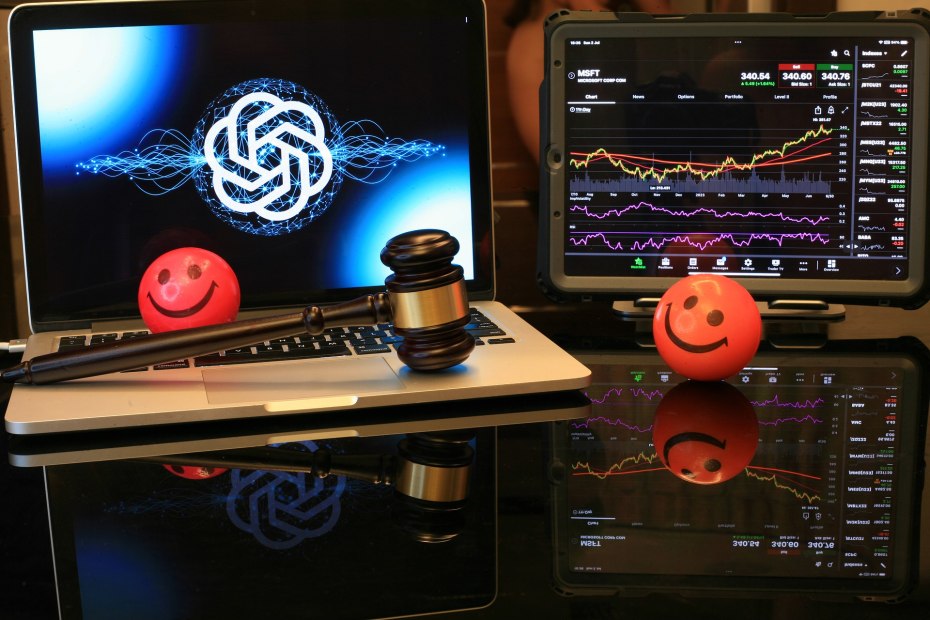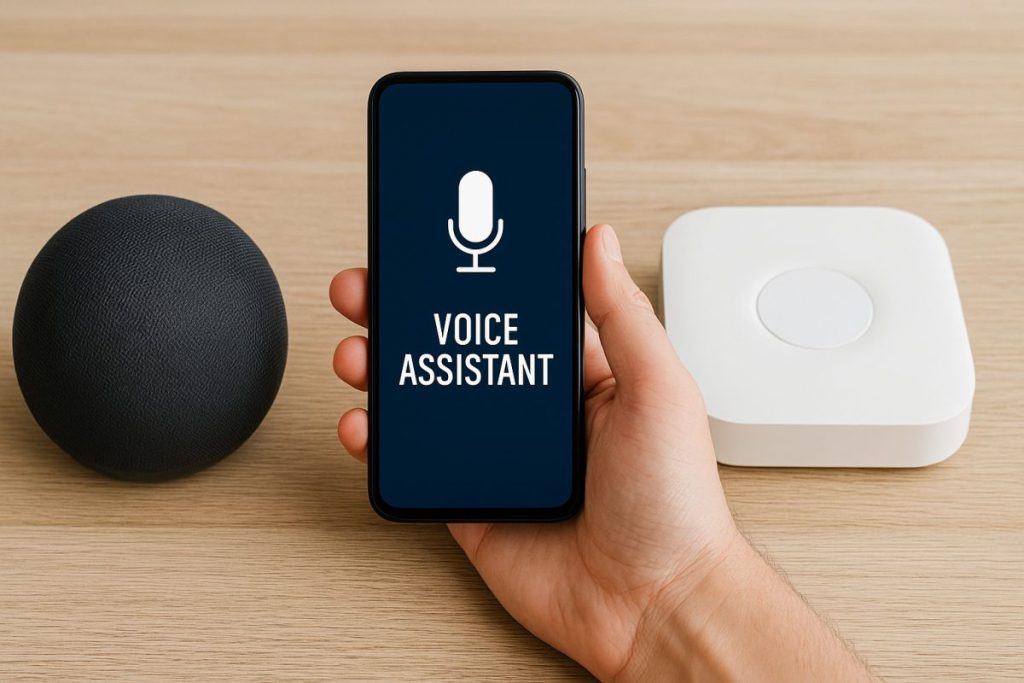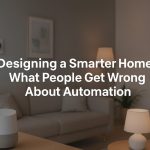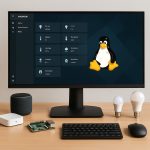In today’s connected homes, convenience is only a voice command away. But when building or upgrading a smart home, many people face a common dilemma: Should you rely on voice assistants like Alexa or Google Assistant, or opt for a dedicated smart home hub like SmartThings or Hubitat? Both systems offer powerful ways to automate your home, but they serve different purposes and excel in different areas.
This guide will help you understand the key differences, advantages, and potential drawbacks of each—so you can make the best choice for your lifestyle and smart home needs.
What Are Voice Assistants?
Voice assistants are AI-powered digital helpers that respond to voice commands to perform tasks, answer questions, or control connected devices. The most popular voice assistants today include:
- Amazon Alexa
- Google Assistant
- Apple Siri
These systems are built into devices like smart speakers (Echo, Nest Audio), smartphones, and even TVs. Their biggest draw? Hands-free control and ease of use.
What Are Smart Home Hubs?
Smart home hubs act as the central control point for all your smart devices. Unlike voice assistants, they focus on device communication, offering deeper automation, improved compatibility across different brands, and often local control (which doesn’t rely on cloud services).
Common examples include:
- Samsung SmartThings
- Hubitat Elevation
- Home Assistant (open-source)
- Aqara Hub
Hubs often support multiple protocols like Zigbee, Z-Wave, and Matter, allowing you to integrate devices that voice assistants alone can’t handle smoothly.
Head-to-Head Comparison
1. Compatibility and Ecosystem
- Voice Assistants: Great with Wi-Fi-based devices. Seamless integration with mainstream brands (Philips Hue, Ring, Nest, etc.). Limited when it comes to advanced device-to-device automations.
- Smart Hubs: Support a broader range of protocols. Perfect for tech-savvy users who want a fully integrated smart home setup.
Verdict: If you own many Zigbee or Z-Wave devices, a smart hub is a better choice.
2. Ease of Use
- Voice Assistants: Extremely user-friendly. Setup is simple and voice commands are intuitive.
- Smart Hubs: Can have a steep learning curve, especially with custom automations or local hosting (like Home Assistant).
Verdict: Voice assistants win in user-friendliness.
3. Automation and Control
- Voice Assistants: Offer basic routines like “Good Morning” or “Bedtime.” Suitable for casual automation.
- Smart Hubs: Allow detailed and conditional automation, such as “Turn off the heating if no one is home and it’s above 20°C.”
Verdict: For serious automation, smart hubs take the crown.
4. Reliability and Speed
- Voice Assistants: Cloud-dependent, meaning they can lag or go offline if your internet is down.
- Smart Hubs: Some offer local processing, keeping your automation running even during outages.
Verdict: Smart hubs are more reliable in the long run.
5. Privacy and Security
- Voice Assistants: Always listening, which raises concerns about data collection.
- Smart Hubs: Especially open-source ones like Home Assistant, offer more control and privacy.
Verdict: For privacy-conscious users, smart hubs are a safer bet.
So, Which One Should You Choose?
Voice Assistants vs Smart Home Hubs?
If you’re just starting your smart home journey, voice assistants are a great entry point. They’re easy, fun, and convenient. But if you want a more powerful, reliable, and future-proof setup, especially for complex automation, then a smart home hub is worth the investment.
Of course, the best setup might be a combination of both—using a hub for deep integration and a voice assistant for quick commands.
Final Word
Whether you choose a voice assistant, a smart hub, or both, the goal is the same: a smarter, more comfortable living environment. Think about your needs, device compatibility, and how much time you’re willing to invest in setup. With the right choice, your home can respond exactly how you want—automatically.
FAQ: Voice Assistants vs Smart Home Hubs
Q1: Can I use both a voice assistant and a smart home hub together?
Yes! Many people combine a smart hub with Alexa or Google Assistant to enjoy both advanced automation and convenient voice control.
Q2: Do I need internet for my smart home to work?
Voice assistants require the internet. Some smart hubs offer local control, allowing devices to function even without a connection.
Q3: Which is better for home security automation?
Smart hubs offer better customization for security systems. But voice assistants can trigger quick commands like turning on cameras or alarms.
Q4: Are smart hubs harder to set up?
Yes, especially platforms like Home Assistant. However, hubs like SmartThings offer a more user-friendly setup.
Q5: Will Matter replace smart hubs or voice assistants?
Matter aims to unify smart devices but will still need controllers—either voice assistants, hubs, or both. It enhances compatibility, not replaces platforms.

The Rise of AI-Powered Tools: Revolutionizing Everyday Tasks
- IoT for Beginners: The Complete Smart Home Starter Guide (2025 Edition)
 Smart home devices are no longer sci‑fi toys for tech geeks – they are affordable, easy to install, and can genuinely make everyday life more convenient, efficient, and secure. This guide walks you through the essentials of getting started with IoT and building a smart home in 2025 without getting overwhelmed by buzzwords and acronyms.…
Smart home devices are no longer sci‑fi toys for tech geeks – they are affordable, easy to install, and can genuinely make everyday life more convenient, efficient, and secure. This guide walks you through the essentials of getting started with IoT and building a smart home in 2025 without getting overwhelmed by buzzwords and acronyms.… - Designing a Smarter Home in 2026: What People Get Wrong About Automation
 Smart homes were once science fiction, but today they’re a reality in millions of households. With voice assistants, smart plugs, and automated lighting systems, it’s easy to assume home automation is simply a matter of plugging in a few devices. Yet, many homeowners quickly discover that “smart” doesn’t always mean simple. In this article, we’ll…
Smart homes were once science fiction, but today they’re a reality in millions of households. With voice assistants, smart plugs, and automated lighting systems, it’s easy to assume home automation is simply a matter of plugging in a few devices. Yet, many homeowners quickly discover that “smart” doesn’t always mean simple. In this article, we’ll… - Automated Online Trading: How IoT is Redefining Financial Markets
 Introduction automated online trading In a world where milliseconds can decide millions, the fusion of Internet of Things (IoT) technology and automated online trading is reshaping global finance. What once relied solely on human judgment now increasingly depends on connected machines, real-time data, and predictive algorithms. From weather sensors influencing agricultural trades to smart logistics…
Introduction automated online trading In a world where milliseconds can decide millions, the fusion of Internet of Things (IoT) technology and automated online trading is reshaping global finance. What once relied solely on human judgment now increasingly depends on connected machines, real-time data, and predictive algorithms. From weather sensors influencing agricultural trades to smart logistics… - The Role of Linux in IoT: Powering the Connected World
 The Internet of Things (IoT) is everywhere—from smart homes and wearable devices to industrial automation and self-driving cars. Behind the scenes, one operating system plays a surprisingly dominant role: Linux. Known for its stability, flexibility, and open-source nature, Linux has become the backbone of countless IoT devices and platforms. But what makes Linux so well-suited…
The Internet of Things (IoT) is everywhere—from smart homes and wearable devices to industrial automation and self-driving cars. Behind the scenes, one operating system plays a surprisingly dominant role: Linux. Known for its stability, flexibility, and open-source nature, Linux has become the backbone of countless IoT devices and platforms. But what makes Linux so well-suited… - The Smart Home Revolution in 2025: How IoT is Transforming Everyday Living
 In the past decade, the vision of a truly smart home has moved from futuristic fantasy to everyday reality. As we step into 2025, the Internet of Things (IoT) has matured into a robust ecosystem, connecting appliances, security systems, lighting, and even entertainment devices under one seamless digital roof. The result? Homes that are safer,…
In the past decade, the vision of a truly smart home has moved from futuristic fantasy to everyday reality. As we step into 2025, the Internet of Things (IoT) has matured into a robust ecosystem, connecting appliances, security systems, lighting, and even entertainment devices under one seamless digital roof. The result? Homes that are safer,…







